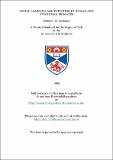Social learning and imitation in human and nonhuman primates
Abstract
Most people assume that monkeys and apes can imitate, but recently, several researchers have suggested there is little convincing evidence of imitation in any nonhuman species. The purpose of the present thesis is to compare the imitative abilities of human and non-human primates. Some of the most convincing evidence for imitation comes from anecdotal reports of imitative behaviour in great apes. A survey of the literature was performed and a database of imitative episodes in chimpanzees, gorillas and orangutans was compiled (using a similar approach to Whiten & Byrne's 1988a tactical deception database). Each report was subjected to a strict evaluation, and it was deemed that 23 reports from chimpanzees, 3 from gorillas and 4 from orangutans provided relatively convincing evidence of imitation. An experiment was conducted to test if chimpanzees can imitate as the anecdotal data suggests. Two chimpanzees were taught to reproduce 15 arbitrary gestures on the command "Do this". Next they were presented with 48 novel items. They imitated 13 and 20 novel gestures respectively. Using a rigorous coding system, two independent observers correctly identified a significant number of the chimpanzees' imitations (P< 0.0001). These results show that chimpanzees are capable of the complex intermodal visual-motor co-ordination and control necessary for imitation. The second experimental chapter explores whether monkeys, apes, and/or humans imitate in the context of a functional task. Six capuchin monkeys (Cebus apella), eight chimpanzees (Pan troglodytes) and 24 children were presented with an analogue of a natural food processing task. The subjects were divided into two groups and each saw a different method for opening an artificial fruit. The children showed quite extensive imitation; the capuchin monkeys showed little to none; while the chimpanzees showed marginal imitative abilities. This constitutes the first experimental evidence of functional object imitation in a nonhuman specie.
Type
Thesis, PhD Doctor of Philosophy
Collections
Items in the St Andrews Research Repository are protected by copyright, with all rights reserved, unless otherwise indicated.

